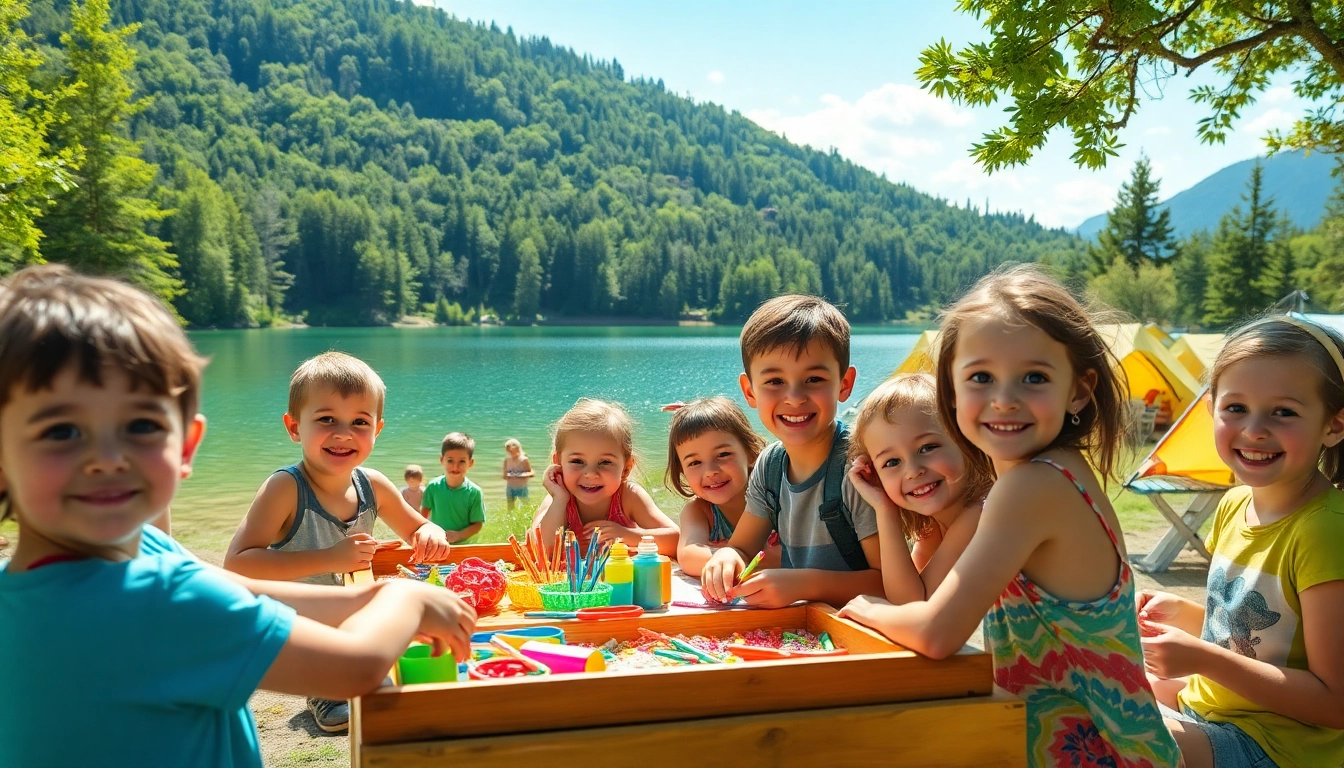As summer draws near, parents often find themselves seeking enriching and fun experiences for their children. One popular solution that comes to mind is holiday camps, which offer unique opportunities for young ones to learn new skills, meet new friends, and create lasting memories. This guide explores the different dimensions of holiday camps, from understanding what they are to how to choose the right one for your family. So, whether your child is an aspiring athlete, a budding artist, or just eager to explore, there’s a holiday camp that can enrich their summer experience.
Understanding Holiday Camps
What Are Holiday Camps?
Holiday camps refer to organized programs designed for children during school breaks, particularly in the summer. They provide a wide variety of activities that are both fun and educational. These camps can run from a few days to several weeks and can be day camps, where children return home each evening, or residential camps, where they stay on-site for the duration. Holiday camps can cater to specific interests, such as sports, arts, science, or general recreation, and are typically led by experienced staff who ensure a safe and engaging environment for all participants.
Types of Holiday Camps Available
Choosing the right holiday camp can be overwhelming, given the broad spectrum of options available. Here’s a closer look at some of the primary types of holiday camps:
- Sports Camps: These camps focus on physical activities and usually concentrate on a particular sport, such as soccer, basketball, or swimming. They help children develop their athletic skills while promoting teamwork and sportsmanship.
- Arts Camps: These camps cater to creative children interested in painting, writing, drama, or music. They provide an opportunity for budding artists to express themselves and hone their craft.
- Adventure Camps: Designed for children who love the outdoors, adventure camps often include hiking, rock climbing, and other stimulating activities. They aim to instill a love for nature while challenging campers physically.
- Academic Camps: These camps focus on enhancing specific academic skills in subjects like science, mathematics, or language arts, often integrating fun activities to keep learning engaging.
- General Recreation Camps: These camps offer a wide array of activities that may include sports, arts and crafts, games, and themed events. They are ideal for children who want a little bit of everything.
Benefits of Attending Holiday Camps
Enrolling your child in a holiday camp can provide numerous benefits, including:
- Social Skills Development: Camps encourage children to make new friends and interact with peers, facilitating social skills such as communication, sharing, and teamwork.
- Skill Enhancement: Whether it’s developing a talent in sports or arts, holiday camps usually focus on skill-building in a playful, supportive setting.
- Increased Independence: Being away from home, even for a day, can help children cultivate a sense of independence and self-reliance.
- Engaging Learning Experiences: Holiday camps create a dynamic learning environment, often integrating educational components into fun activities.
- Physical Activity: With activities ranging from swimming to hiking, camps provide a healthy outlet for kids to stay active during their break from school.
Top Activities at Holiday Camps
Outdoor Adventures and Sports
Outdoor adventures are a staple of many holiday camps, especially those designed with active play in mind. Children may participate in various sports such as soccer, basketball, swimming, and even extreme sports like rock climbing and zip-lining.
Sports camps can help children advance in their athletic skills, competing in friendly tournaments or engaging in exciting team-building exercises. The camaraderie that develops among campers enhances not only their sports skills but also friendships that may last a lifetime.
Creative Arts and Crafts
For those inclined towards creativity, arts and crafts are common offerings at holiday camps, providing an excellent avenue for self-expression. Activities may include painting, drawing, pottery, or even drama and dance.
Many arts camps incorporate skill workshops led by experienced instructors, encouraging children to explore new mediums and learn various techniques while fostering their creativity in a supportive environment.
Team-Building Exercises
In addition to sports and arts, holiday camps often feature team-building exercises designed to strengthen relationships among participants. Activities such as obstacle courses, scavenger hunts, and trust falls encourage collaboration and communication, fostering a sense of belonging within the group.
These exercises can improve emotional intelligence and problem-solving skills and can be pivotal for children in learning how to work with others effectively.
Choosing the Right Holiday Camp
Factors to Consider When Selecting a Camp
When it comes to selecting the perfect holiday camp for your child, several factors should guide your decision:
- Age Appropriateness: Ensure that the camp is suitable for your child’s age group, containing activities that will be engaging rather than overwhelming.
- Location: Consider how far you’re willing to travel daily or whether a residential camp is viable for your family.
- Special Interests: Look for camps that align with your child’s hobbies and interests, whether in sports, arts, or academics.
- Schedule Flexibility: Some camps offer full-day, half-day, or even customizable programs. Choose one that fits your family’s schedule.
- Cost: Holiday camps can vary widely in price. Set a budget and explore camps that provide quality experiences within that range.
How to Evaluate Camp Quality
Once you’ve narrowed down your options, evaluating the quality of each camp is crucial. Here are key aspects to consider:
- Accreditation: Check if the camp is accredited by a recognized organization. This ensures they meet specific standards in safety and staff training.
- Staff Qualifications: Review the qualifications and experience of the camp’s leadership team. Camp counselors should be well-trained in child development and safety protocols.
- Staff-to-Camper Ratio: A lower ratio can often lead to a more personalized experience for each child while enhancing safety.
- Facility Quality: Visit the camp facilities if possible to assess their cleanliness, safety measures, and suitability for the planned activities.
Reading Reviews and Testimonials
Exploring reviews and testimonials from parents who have previously enrolled their children can provide valuable insights into a camp’s reputation. Look for feedback on aspects like:
- Safety Measures: How well did the camp ensure the safety of its campers?
- Community Feel: Did children feel happy and welcomed?
- Engagement Level: Were activities stimulating and appropriate for campers’ ages?
Websites, social media groups, and community forums can often provide a wealth of information and personal experiences from parents.
Preparing Your Child for Holiday Camps
What to Pack for Holiday Camps
Proper preparation is key to ensuring a smooth transition to camp life. Here’s a general packing list to help:
- Clothing: Pack suitable clothing for various activities. Depending on the camp, this may include swimwear, athletic gear, and clothing for creative arts.
- Comfort Items: Familiar items, like a favorite stuffed animal or blanket, can ease anxiety and help children feel at home.
- Personal Hygiene Products: Include necessary health items such as sunscreen, insect repellent, and toiletries.
- Food and Water: If applicable, pack snacks and a refillable water bottle to keep your child hydrated.
Tips for Easing Camp Anxiety
It’s normal for children to feel a mix of excitement and anxiety about attending a new holiday camp. Here are some strategies to ease their concerns:
- Visit the Camp Together: If possible, take your child to visit the camp ahead of time to familiarize them with the setting and staff.
- Encourage Open Communication: Let your child express their worries. Discussing these feelings can validate their emotions and make them feel understood.
- Share Personal Camp Experiences: If you attended a camp, share your positive memories and learning experiences to highlight the fun aspects.
Encouraging Independence and Social Skills
Encouraging independence can significantly enhance your child’s camping experience. Here are some ideas:
- Practice Self-Care Skills: Teach your child the basics of self-care, such as dressing themselves, packing their belongings, and following a simple daily routine.
- Foster Group Interaction: Arrange playdates or group activities prior to camp that require team cooperation, building their confidence in social settings.
- Set Goals: Help your child set achievable goals for their camp experience, whether it’s making a new friend or trying a new activity, motivating them to step out of their comfort zone.
Post-Camp Experiences and Reflections
How to Continue the Learning After Camps
The end of camp doesn’t have to signal the end of learning and growth. Here are ways to extend the camp experience:
- Keep Skills Sharpened: Encourage your child to practice any skills they learned at camp, whether sports techniques or art projects.
- Reflect on Experiences: Have discussions about memorable moments from camp to reinforce what they learned and enjoyed.
- Enroll in Related Classes: Consider classes or workshops that align with your child’s interests, maintaining their engagement and passion.
Building Lasting Connections with Camp Friends
After camp, children often want to maintain the friendships they formed. Here’s how to help them:
- Coordinate Outings: Set up playdates or group outings with camp friends to keep those connections alive.
- Encourage Communication: Help your child exchange contact information so they can stay in touch via calls, texts, or social media.
- Organize Reunions: Consider organizing a reunion or gathering for campers and their families to reconnect and reminisce.
Sharing Experiences and Creating Memories
Consider creating a scrapbook or journal reflecting on the camp experience, as it fosters creativity and serves as a lasting memory of experiences. Parents can also encourage children to write letters to friends made during camp or to share their stories with family and relatives, which can enrich their communication skills and confidence.
In retrospect, holiday camps can be transformative experiences for children, providing not only fun but also essential life skills. They offer a break from routines and allow for personal growth in a structured, supportive environment. By understanding the types of camps available, their benefits, how to prepare, and what to expect post-camp, you can make an informed choice that supports your child’s development and leaves them with fond, cherished memories.



